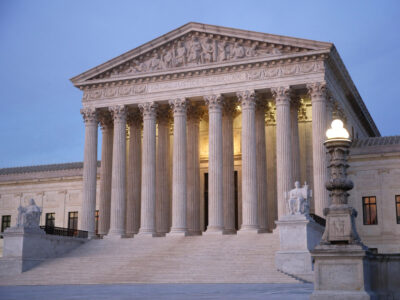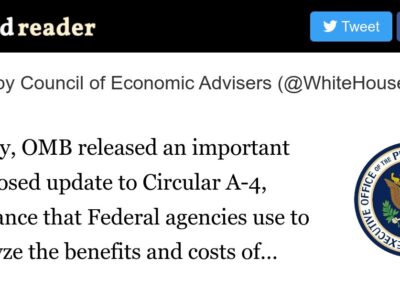scientific uncertainty
Chevron Gets the Headlines, But State Farm May Be More Important
The abortion pill case could undermine the authority of agency’s expert judgments.
The Chevron doctrine requires judges to defer to an agency’s interpretation of a statute if that interpretation is reasonable. The State Farm case, which is much less widely known, requires courts to defer to an agency’s expert judgment unless its reasoning has ignored contrary evidence or has a logical hole. As you probably already know, …
Continue reading “Chevron Gets the Headlines, But State Farm May Be More Important”
CONTINUE READINGRevamping Cost-Benefit Analysis
Proposed changes will make CBA more climate friendly.
Last week, the Biden White House released proposed changes in the way the government does cost-benefit analysis. CBA has been a key part of rule making for forty years. The proposal is very technical and low-key, but the upshot will be that efforts to reduce carbon emissions will get a leg up. In particular, the …
Continue reading “Revamping Cost-Benefit Analysis”
CONTINUE READINGScenarios and Uncertainty
Imagining different futures can be the best way to think through options when we don’t know the odds.
In environmental law, we’re often operating at the limits of knowledge about the natural world and human behavior. Climate change is well understood in some ways, but it will set off a chain of reactions that we only partly understand. It’s also difficult to predict the future of ecosystems, future energy prices, technological changes, and …
Continue reading “Scenarios and Uncertainty”
CONTINUE READINGCost-Benefit Analysis and Deep Uncertainty
How should agencies take into account “the things we know we don’t know”?
Since 1981, cost-benefit analysis (CBA) has been at the core of the rule making process. OIRA, the so-called “regulatory czar” in the White House, must approve every significant regulation based on a review of its CBA. But CBA has had a major blind spot. It embodies techniques for analyzing possible harmful outcomes when the probability …
Continue reading “Cost-Benefit Analysis and Deep Uncertainty”
CONTINUE READINGAre the Coronavirus Models Too Pessimistic?
Unfortunately, if anything, reality has often turned out somewhat worse than predicted.
The White House thinks coronavirus models are too pessimistic. If anything, the evidence suggests the models aren’t pessimistic enough. Their projections of future deaths have often been too low.
CONTINUE READINGInterpreting Models of Coronavirus Spread
Models are crucial to making policy decisions during the epidemic, but you have to know how to use them.
This post works through an exercise in how to use and interpret models of disease spread. Here are the takeaways for policy analysis: You need to know about a model’s sensitivity. Particularly in settings where the specific numbers really matter, such as forecasting how many hospital beds will be needed, it’s important to take into …
Continue reading “Interpreting Models of Coronavirus Spread”
CONTINUE READINGUncertainty in the Age of Coronavirus
There’s a lot we don’t know at this point. How should we deal with that?
Knowledge about the coronavirus is limited but growing. In the meantime, how should we cope with this uncertainty? I can’t give you psychological advice, but I can say something about how to think about this uncertainty. How to make decisions under uncertainty is something we know a lot about from the environmental sphere. Uncertainty is …
Continue reading “Uncertainty in the Age of Coronavirus”
CONTINUE READINGCan Incomplete Information Still Be Cause For Alarm?
How much comfort should people take from the remaining gaps in our knowledge of climate change. Not much, is the answer. Scientists have learned a lot about climate, but there are still pieces of the puzzle that are yet to be filled in. Here’s a nice picture that Nobel Laureate Mario Molina uses to show …
Continue reading “Can Incomplete Information Still Be Cause For Alarm?”
CONTINUE READINGEnvironmental Law and “The Law of the Horse”
“The Law of the Horse” is the title of the (perhaps apocryphal) treatise on the same subject. The point of the reference is that “there’s no there there,” as Gertrude Stein might have said: the law of the horse would simply be a compendium of contract cases that happened to involve horses, tort cases that …
Continue reading “Environmental Law and “The Law of the Horse””
CONTINUE READINGClimate Change versus the Benzene Case
The Benzene Case — more properly, Industrial Union Dept. v. American Petroleum Inst. — is almost thirty years old, but is still the Supreme Court’s most important statement on risk regulation. After considering mountains of evidence, OSHA issued a rule restricting benzene in the workplace. Benzene was known to be a carcinogen; the evidence was …
Continue reading “Climate Change versus the Benzene Case”
CONTINUE READING









